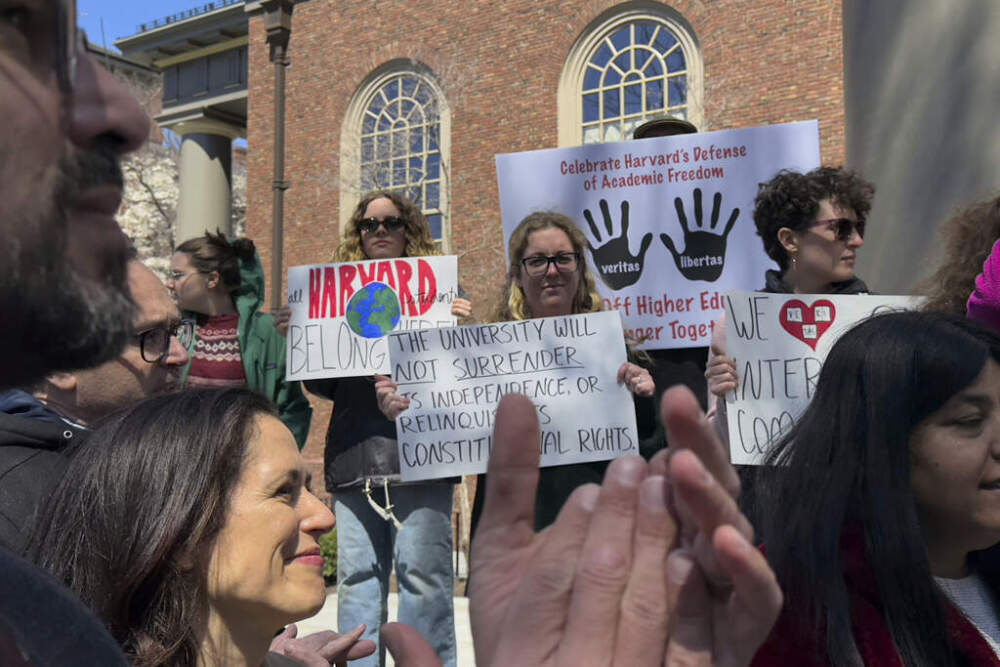Advertisement
Abrupt visa terminations leave Mass. international students with uncertain future in the U.S.
When a friend called earlier this month to say her visa had been revoked, a recent Massachusetts university graduate took it lightly at first.
“I thought, why would I get anything like that?" she recalled. "I've never done anything wrong.”
But she stopped cooking dinner to check.
She opened her laptop and found an email from her consulate that said the U.S. Department of State had revoked her visa, too. Another email said her authorization to work in the United States was canceled. She said the emails did not provide any reason.
“My hands were literally shaking. My legs were shaking,” she said. “I just didn't know what to do.”
WBUR is not identifying the individual or the name of her school. She asked to remain anonymous because of the risk of detainment by immigration officials.
The recent graduate came to the United States on a student visa to pursue her master's degree.
She is among scores of students and recent graduates across Massachusetts, and nationwide, who have had their visas revoked or records of immigration status terminated abruptly by federal officials this spring. Legal advocates with the American Immigration Lawyers Association say there have been at least 4,700 record terminations across the country.
The Trump administration has offered little explanation, leaving international students and college staff to navigate this new murky terrain.
Earlier this year, immigration officials detained students and recent graduates known to have spoken out against the war in Gaza. Now, immigration attorneys say, students who've lost their visas have often had only minor encounters with law enforcement — such as a speeding ticket. Some have charges that were dismissed. Others have no record at all.
“She's not a criminal. These kids are not criminals,” said Jennifer Cameron-Moore, the recent graduate's lawyer. “They're students who are just trying to get their education to contribute to our society.”
Roughly 80,000 international students study on Massachusetts campuses. With no discernible pattern to explain the federal government’s recent actions, many worry they could be next.

Abdullah Shahid Sial is a Harvard sophomore and president-elect of the undergraduate study body. He moved to the U.S. from Pakistan to attend college. Sial said the government's lack of transparency is unnerving.
“It's so ridiculously uncertain as to who they will go after next,” he said. “There is no pattern, there is no precedent, there is no way to predict what will happen.”
Many international students, Sial added, are now wiping their social media accounts and changing plans to travel back home.
“You don't want a digital footprint and you don't want to say something which you'll regret two weeks later when you're sitting on a plane heading back to Pakistan or sitting in a facility in Louisiana,” he said.
With two years left in his studies, Sial said it's not realistic for him to stop all travel out of the country. But he understands why others are restricting their movement.
Advertisement
Massachusetts colleges and universities have advised students to reconsider leaving the country. One school even canceled study abroad programs scheduled to run this summer. Universities have issued guidance recommending that students carry their immigration documents with them at all times. Staff have held drop-in office hours and group sessions to field questions about students’ rights under the quickly changing political landscape.
Kalpen Trivedi oversees international student support at the University of Massachusetts Amherst, where he is the vice provost of global affairs.
He said staff have been proactively monitoring the Student and Exchange Visitor System, or SEVIS, a database run by the Department of Homeland Security that keeps track of who is in the country on student and visitor visas. Typically, school administrators terminate student SEVIS records as needed, according to the Department of Homeland Security. Now, school administrators say the federal government is terminating records, sometimes with no notification to the school or the student.
Most foreign-born students studying in the U.S. are on F-1 visas. If their record in SEVIS is terminated, the student must either apply for reinstatement or leave the country immediately, according to DHS. If they don't, they may be at risk of arrest and detainment by ICE officials.
“It's just a lot of anxiety and uncertainty and fear at a time when you know midterms and finals are not that far down the road, and students are trying to study and graduate,” Trivedi said.
At Harvard, the Trump administration is escalating its fight with higher education, and particularly foreign students. After the university's president vowed to not give into the administration's demands on admissions and hiring policies, the DHS threatened to revoke Harvard's eligibility to enroll international students unless the school releases all their disciplinary records.

Leo Gerdén is a senior at Harvard from Sweden. He said international students now carry their visa documents with them everywhere — even on campus. Many, he added, are also self-censoring. He knows students who have refrained from penning op-eds in the student paper and conducting research in their area of interest for fear of being targeted.
“It is simply the most dangerous response possible to authoritarianism,” he said. “If we all choose to be silenced, then other people are going to follow suit."
Gerdén said his peers fear the scenario they saw play out on video not too long ago. Masked immigration agents pulled Tufts doctoral student Rümeysa Öztürk off the street and sent her to a federal detention center hundreds of miles away in Louisiana.
International students at Harvard brace for something similar to happen to a member of their community, Gerdén said.
"There is definitely a fear that Trump is going to set more examples, and Harvard is often in the spotlight,” he said. “So I think it's very likely that a Harvard College student is going to face the same situation.”
For those who’ve already had their visa revoked, that scenario isn’t a far off possibility.
The recent graduate from a Massachusetts college said everything has changed since that day she got the email alerting her to her visa status change. She hasn't returned to work because she is no longer authorized. She worries she will lose her job and the health insurance it provides. If that happens, she won't be able to afford rent.
Her parents bought tickets to fly out from her home country for her graduation ceremony in May. They've cancelled those plans. Now, she isn't even sure if she can attend.
“Everything I had inside me is dead right now,” she said. "There was so much hopes and dreams and everything, and I feel like they're all shattered.”
This segment aired on April 18, 2025.
